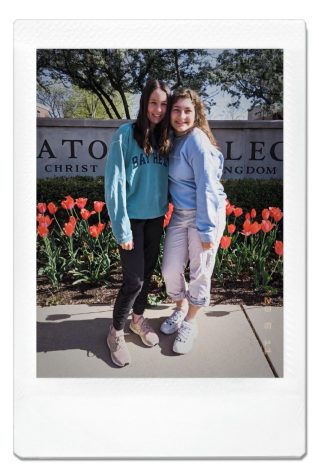South students choose gap year as alternative post-grad plan

May 24, 2019
While most seniors from South are heading straight to one of thousands of universities across the U.S.A. and beyond, senior Yvonne Fondrevay is taking a slightly different path. Beginning this summer, Fondrevay will be living and working in cities in Spain, Morocco, France and Italy through Workaway, an international hospitality service. She will then be attending New York University in the Spring of 2021.
Fondrevay says that she decided to take a gap year to get better at Spanish and French, to take a break from the stresses of the educational system and to be able to learn in the way that she wants.
“I felt like going directly to college was just not for me,” Fondrevay said. “I wanted time to myself where I could really learn for learning’s sake. I want to improve language [and] to learn more about the world around me. It’s a time where I get to read books that I want to because I want to, study things I want to because I want to, and just gain a perspective on education and learning that is outside of the classroom for once in a much less stressful environment where not every single piece of learning has a grade directly tied to it.”
Fondrevay says that she organized her gap year to ensure that she could combat the stigma that people who take gap years don’t go back to college. She says that she made sure that she committed to a college, deferred her enrollment, and planned every aspect of her gap year before making a decision.
“I read a lot about gap years and what people do with them before even making the decision and deferring my [college] application,” Fondrevay said. “One of the biggest issues that a lot of people suffer from is that they decide ‘I’ll take a gap year’, and then that turns into more, and then they never go back to college. That is never, ever what I wanted to do. Me taking a gap year doesn’t make me someone who’s not excited for college and the education, it just means I want to do it in a slightly different arena for a little while.”
Senior Lee Kleck is also taking a gap year and going on two mission trips—one in Costa Rica for three months and one in South Africa for six months—through an organization called Experience Mission.
“I started thinking about [taking a gap year] probably the summer before junior year,” Kleck said. “Then I went on a short-term mission trip and I just completely fell in love with it. After that, I started praying about it, and I just felt like God was telling me to do this.”
Kleck says that the advantages of taking a gap year are gaining worldly experience that one can use later on.
“As far as what I’m doing with [my gap year, the benefits are] getting experience,” Kleck said. “Just taking a gap year alone would give you freedom to do whatever you want without having somewhere to be all the time. But I feel like having a whole year where you don’t have any structure could be bad. I [will] have something to do all the time because I’m going to be in Costa Rica [and] we’re going to constantly have something to do. I know that I’m going to grow a lot.”
Fondrevay agrees that taking a gap year can be very productive, but says that it isn’t for everyone. However, she believes that people should be open to the idea of taking an alternate route.
“It’s not the best option for everyone,” Fondrevay said. “Sometimes it is better for you to go from high school to college. But don’t be afraid to take a year “off.” If you feel like that’s right for you, don’t be afraid just because of the perception of [gap years] by other people. I’d say consider it, and don’t write it off immediately.”












